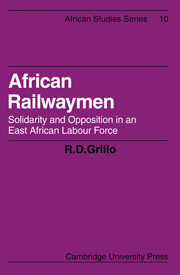Book contents
- Frontmatter
- Contents
- List of figures
- List of tables
- Acknowledgements
- List of abbreviations
- Fig. 1 Kampala City: main urban area and suburbs
- Fig. 2 The EARH Housing Estate at Nsambya and immediate environs
- Introduction
- 1 The social and economic framework
- 2 The railway community in East Africa and at Kampala
- 3 Towards an African proletariat?
- 4 Social relationships and the industrial framework
- 5 Status, reputation and class
- 6 Social mobility: strategies for success and responses to failure
- 7 Urban associations and competition for status
- Conclusion
- Appendixes
- Notes
- List of references
- Index
1 - The social and economic framework
Published online by Cambridge University Press: 04 August 2010
- Frontmatter
- Contents
- List of figures
- List of tables
- Acknowledgements
- List of abbreviations
- Fig. 1 Kampala City: main urban area and suburbs
- Fig. 2 The EARH Housing Estate at Nsambya and immediate environs
- Introduction
- 1 The social and economic framework
- 2 The railway community in East Africa and at Kampala
- 3 Towards an African proletariat?
- 4 Social relationships and the industrial framework
- 5 Status, reputation and class
- 6 Social mobility: strategies for success and responses to failure
- 7 Urban associations and competition for status
- Conclusion
- Appendixes
- Notes
- List of references
- Index
Summary
East Africa – Kenya, Uganda and Tanzania – is what used to be called an ‘underdeveloped’ area. The fashion in labels has changed, but the facts remain. They are vast countries, sparsely inhabited overall, but with dense concentrations in fertile areas. The majority of the population gain a livelihood as peasant farmers whose standard of living measured in conventional economic terms is low. Per capita income in 1969 was in Kenya £47 per annum, in Uganda £33. Disease, illiteracy, hunger, are the features commonly associated with such economies. In the last decade the area has experienced rapid political and social change associated with the end of colonial rule and the attainment of independence. In broad terms this is the context in which this study is set. This chapter will document such features of the social and economic backgrounds of Uganda and Kenya as are necessary for an understanding of what follows. The discussion covers ground familiar to those acquainted with the African literature on urbanisation and migration. The first sections deal with the place of wage employment in the two economies and the structure of what is still largely a migratory labour force. The Uganda material updates existing studies by social scientists working in that country in the fifties (e.g. Elkan 1960, Powesland 1957, Richards (ed.) 1954) and in some respects confirms their findings. Some important changes will, however, be noted, especially the tendency towards greater ‘stability’ on the part of African workers.
- Type
- Chapter
- Information
- African RailwaymenSolidarity and Opposition in an East African Labour Force, pp. 8 - 18Publisher: Cambridge University PressPrint publication year: 1974



